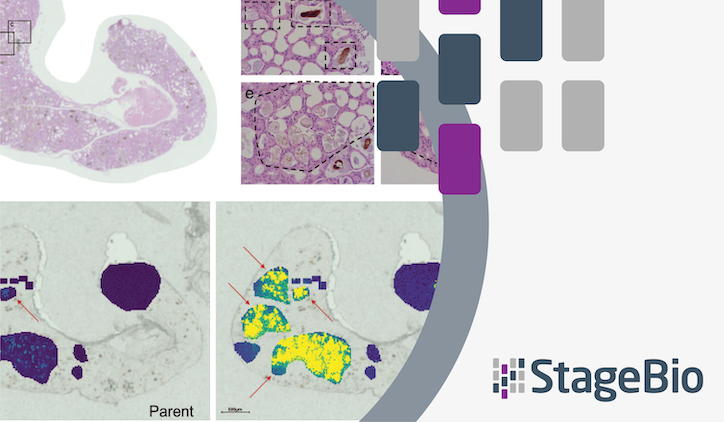Mass Spectrometry Imaging (MSI) measures in tissue sections at microscopic resolution the mass-to-charge ratio of ions via an analytical technique that makes the identification of different molecular species possible.
As such, MSI offers researchers a label-free technique for detecting molecules across different tissues and gathering highly detailed spatial data. As MSI continues to evolve, researchers are realizing the technology’s potential for providing the high-quality sampling needed for accurate and reliable findings in drug metabolism research, nonclinical safety assessments, and various other nonclinical and clinical studies.
StageBio Director of Digital and Quantitative Pathology Thomas Lemarchand, DMV, DESV-AP, PhD, DECVP, recently co-authored a paper detailing the capabilities of MSI that make it an effective technology in diagnostic and toxicologic pathology. On top, this “points to consider” article presents several recent field-case impactful examples.
The paper, published in Sage Journals and accessible here, shares the advantages of utilizing MSI, such as the ability to:
- Identify therapeutic targets by simultaneously localizing and quantifying thousands of pharmacodynamic markers in a tissue microenvironment and drug
- Observe drug efficacy via surrogate biomarkers
- Better understand and predict the potential benefits of a candidate compound
Key benefits of MSI for diagnostic and toxicologic pathology
According to Dr. Lemarchand and his co-authors, key benefits of MSI in diagnostic and toxicologic pathology include:
- Histology compatible
- Label-free application
- Spatially resolved
- Multiplexed
- High specificity
MSI techniques most helpful to pathologists and other researchers
Additionally, the paper introduces readers to the three MSI techniques that enable researchers to detect, in situ, endogenous and exogenous molecules across an expansive range of molecular weight and polarity. These techniques are:
- Matrix-Assisted Laser Desorption Ionization (MALDI)
- Desorption ElectroSpray Ionization (DESI)
- Secondary Ion Mass Spectrometry (SIMS)
All three of these techniques provide spatial resolution along with detailed molecular information regarding morphologic changes that occur in tissues. However, while the methods listed make MSI an effective technology in diagnostic and toxicologic pathology, Dr. Lemarchand and his co-authors stress that knowledgeable pathologists are critical to the successful application of MSI in discovery-based biomarker research, precision medicine research, and pathology research on drug metabolism, pharmacokinetics/pharmacodynamics, and toxicology.
Access the paper at Sage Journals
Read and download the paper here to learn about MSI fundamentals, case examples which demonstrate the benefits of MSI, and the importance of MSI expertise.
